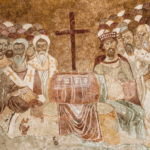Quick Questions About Christianity
Have a look at this story Jesus told.
Two men went to the Temple to pray. One was a Pharisee [a very religious man], and the other was a dishonest tax collector. The proud Pharisee stood by himself and prayed this prayer: ‘I thank you, God, that I am not a sinner like everyone else, especially like that tax collector over there! For I never cheat, I don’t sin, I don’t commit adultery, I fast twice a week, and I give you a tenth of my income.’ “But the tax collector stood at a distance and dared not even lift his eyes to heaven as he prayed. Instead, he beat his chest in sorrow, saying, ‘O God, be merciful to me, for I am a sinner.’ I tell you, this sinner, not the Pharisee, returned home justified before God. (Luke 18:9-14)
I wonder who do you identify with as you read this parable? Are you like the religious man—proud of your moral character and the things you have done? Are you more like the tax collector—painfully aware of your own shortcomings? Perhaps you would like to create a third category for yourself—not as sinful as the tax collector yet not as self-righteous as the religious man? Perhaps you would be outside the temple saying “I thank God that I am not a religious hypocrite like that Pharisee.”
The Problem with Comparing
We often try to assess our moral standing by comparing ourselves with other people. We know we’re not as bad as some people; and we know we’re less self-righteous than some religious people who look down on everyone else. So we feel good about ourselves. We tell ourselves that we’re basically okay and that God won’t worry about our minor misdeeds.
But Jesus warns us that this whole approach is a mistake. It’s God we need to worry about—not other people. And compared to his his perfect standards we are all hopeless and helpless.
God created us to know him and be his friends; he gave us a world full of good things. But we neither show him real gratitude nor treat him as God.
Perhaps our understanding of our moral nature would be clearer if we realised what sin actually is. Very often we think of sin as selfish things we do against other people yet the Bible sees sin as something that begins in our attitude to God. God created us to know him and be his friends; he gave us a world full of good things. Yet in return we neither show him real gratitude nor treat him as God. We habitually refuse to trust God and stubbornly go our own way as if he didn’t exist. The apostle Paul writes that the root of sin—the thing that really offends God—is that humans “neither glorified him as God nor gave thanks to him.” (Romans 1:21)
Same Boat, Same Hope
The sober verdict delivered by the Bible is that we are all in the same boat. We’ve all turned away from God and done our own thing. We’re all under his judgment for our ingratitude. There are no “good people”. We’re all partners in the same rebellion whether our wrongdoing is notorious or commonplace. In the words of Romans 3:10: “There is no one righteous—not even one”
But if we ask God for mercy there is also great hope. Jesus says that, while the self-righteous pharisee achieves nothing by his pride, the tax-collector leaves God’s presence having received forgiveness. God has made a way for us to be forgiven and to begin a new life through the death and resurrection of Jesus Christ. If we come to him in humility that new life can be ours.
If we claim to be without sin, we deceive ourselves … If we confess our sins he is faithful and will forgive us our sins and purify us from all unrighteousness. (1John 1:8-9)
Photo: Thomas Hawk, flickr















